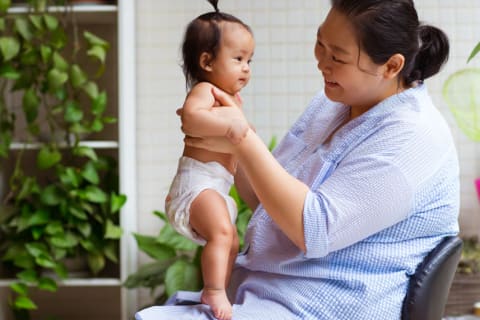Advertisement

As a new mom, I've chosen to spend the next 26 days confined to my house. Activities like hair washing will be infrequent to none, touching cold objects and drinking cold water avoided, and physical activity including household chores and walking outdoors will be completely off limits. I will adhere to a strict postpartum diet of organ meat and chicken soups prepared with Chinese herbs. These practices make up the Chinese postpartum practice known as zuò yuè zi, also called "sitting the month" or "confinement month." While they may sound new and peculiar to some (they did to me when I first learned about them), zuò yuè zi has been around for centuries and has recently become popular among Generation X and millennial new moms, both of Chinese descent and not.
Confinement month: What is it?
The confinement month is an extended period of rest1 for mothers postpartum lasting anywhere from 26 to 45 days in which mothers and their babies are confined to their homes and cared for by other women; traditionally mothers or mothers-in-law step into this caretaking role, but hiring a confinement nurse or checking into a confinement hotel have become new norms in our modern society.
In traditional Chinese medicine, the belief is that after a woman has a baby, there is an empty space in her body where the baby once was. Her body is open, her ligaments loose, and it’s believed that if "yin" or wind/cold comes into this open space, it will cause future ailments and prevent the body from properly recovering. Thus, the practice of confinement emphasizes staying warm by remaining indoors and abstaining from cold foods/drinks, from touching cold objects, and from washing one's hair lest one catch a chill. All of this is done during the period when the mother’s body "closes back up," so to speak.
For the full list of confinement rules—see here.
Confinement month: Diet.
The diet during the confinement month is the cornerstone of this practice and focuses on rebalancing "chi" or energy force, the balance of yin and yang. Yin, or cold, foods are avoided, and specific confinement meals are eaten based on traditional Chinese medicine.
The first week focuses on foods meant to flush out the remaining placental blood; the second week incorporates collagen- and iron-rich soups, often made with organ meat, to rebuild the mother’s body; and the third week focuses on foods to encourage a healthy milk supply. Chinese herbs are added to these nourishing meals.

While I’ve chosen to hire a Taiwanese postpartum nurse to live with us, oversee this process, and cook the meals, which I’ll be documenting on my blog, I was happy to find there are confinement month meal delivery services and cookbooks popping up for moms to draw from these traditions on their own as the practice becomes more widespread.
Confinement month: Making it fit a modern world.
Confinement rules was a central topic among my Chinese American friends when they started getting pregnant. Would you or wouldn’t you wash your hair, abstain completely from going outdoors, or sneak foods not permitted were often topics up for debate. The general consensus: Follow the practice as best you can, but when you need a bite of ice cream or an In-N-Out burger, or a shower—go for it, just not often.
Confinement month: Why do it?
Though I'm not Chinese myself, learning about the practice from friends and my mother-in-law and hearing their positive experiences of quick recoveries and feelings of being supported made the practice resonate with me.
But what truly solidified my conviction to follow the practice of confinement postpartum was my interview with doula, sexologist, and author of The Fourth Trimester: A Postpartum Guide to Healing, Kimberly Johnson.
"Right now our culture is showing us what happens when we don’t take care of women after they have babies," she explained to me. "Sixty-seven percent experience marital decline, 86 percent have pelvic floor dysfunction, one in seven have postpartum depression—and all of these things are not necessary if the right care is given to mothers. When women are cared for postpartum, it’s been found in studies the rate of postpartum depression is reduced to 1 percent."
During our conversation she cited various cultures around the world with postpartum practices similar to China’s confinement practice, but when I asked why there wasn’t something like this in Western culture, her answer: the Industrial Revolution and our love of the term "badass."
"We did have it once," she explained. "It was called 'lying in,' and it happened up until the turn of the last century, but things changed once midwives stopped overseeing births and the Industrial Age happened. After that we became a culture that worships productivity, and resting during the postpartum period is not productive. It is if you look at it in the long term, which is what Chinese medicine is so good about since they see the benefit of slowing down in the short run to preserve life force and longevity down the line, but Western cultures only see the short-term productivity loss. We love the terms 'badass,' 'girlboss,' and 'superwoman,' and these terms are associated with not resting. Women get a lot of attention and positive praise for not stopping. So when you go back to work 10 days after having a baby, everyone is impressed, and it's like no, that's neurosis. The postpartum period is a time that needs to be respected."
In other news, I tried using placenta skin care products—here's how it went.
Watch Next
Enjoy some of our favorite clips from classes
Enjoy some of our favorite clips from classes
What Is Meditation?
Mindfulness/Spirituality | Light Watkins
Box Breathing
Mindfulness/Spirituality | Gwen Dittmar
What Breathwork Can Address
Mindfulness/Spirituality | Gwen Dittmar
The 8 Limbs of Yoga - What is Asana?
Yoga | Caley Alyssa
Two Standing Postures to Open Up Tight Hips
Yoga | Caley Alyssa
How Plants Can Optimize Athletic Performance
Nutrition | Rich Roll
What to Eat Before a Workout
Nutrition | Rich Roll
How Ayurveda Helps Us Navigate Modern Life
Nutrition | Sahara Rose
Messages About Love & Relationships
Love & Relationships | Esther Perel
Love Languages
Love & Relationships | Esther Perel


















